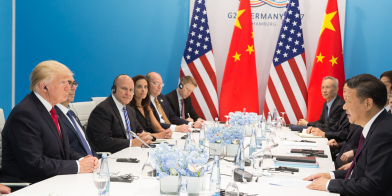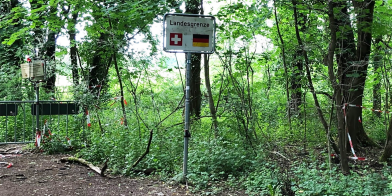05
The US-China Clash over Corona Has Implications for Nuclear Arms Control

A renewed debate about China’s nuclear deterrent is highlighting the risks posed by the US-China nuclear competition at a time when relations are exacerbated by the global impact of the corona crisis. According to Névine Schepers, managing the US-China nuclear relationship is difficult given the absence of mechanisms for strategic dialogue and growing Chinese frustration over US calls for Beijing to join trilateral arms control efforts.
Trust and Transparency: Antidotes against Corona Conspiracies
Many theories are circling around the origin of the novel coronavirus SARS-CoV-2. Although scientists agree that the virus has not been manipulated, rumors persist about the possibility that it leaked from a laboratory in Wuhan or that it is a biological weapon. The Biological and Toxin Weapons Convention (BTWC) could help in reducing the uncertainty that provides a basis for conspiracy theories, as Michèle Gemünden argues in her contribution to the CSS Corona Blog.
Lifting Border-closures in Europe: More Coordination, Less National Go-it-Alones

Managing the supply of essential goods and the flow of seasonal workers during the corona crisis is challenging many European states. A coordinated approach towards lifting border closures is required, as Julian Kamasa argues in this contribution to the CSS Corona Blog. At this stage, gradually opening borders between mildly affected neighboring regions could mean that Schengen could co-exist with the coronavirus.
Obstacles Ahead: Preserving the JCPOA
In this CSS Policy Perspective, Névine Schepers argues that the next six months are critical for the survival of the Iran nuclear deal. Europe has a role to play in preserving the agreement and addressing the challenges it faces.
African Solutions to African Challenges: The Role of Legitimacy in Mediating Civil Wars in Africa
Studies on the mediation of civil wars typically conclude that due to limited resources African mediation efforts are often unsuccessful. In this International Organization article, CSS' Allard Duursma shows that these findings do not hold true when attempts by African actors are systematically compared to those of non-African ones. In contrast to the existing literature, he shows that African third parties are far more likely to conclude negotiated settlements that are more likely to be durable.
The Western Balkans between the EU, NATO, Russia and China

In the Western Balkans, Russia has successfully encouraged resistance to further NATO expansion. China is also making inroads, creating new financial and economic dependencies that complicate the EU accession processes. Further transformation of the region depends on the EU’s ability to intensify dialogue with candidate countries on mid-term achievable objectives, as Henrik Larsen contends in this CSS Analysis.
The Swiss Candidacy for the UN Security Council
For the first time, Switzerland applies to take a seat as a non-permanent member of the UN Security Council, for the period from 2023 to 2024. Switzerland has good chances of being elected. However, the candidacy has proven controversial domestically. Being a member of the Security Council would undeniably entail many opportunities, but also some risks, as Fabien Merz argues in this CSS Analysis.